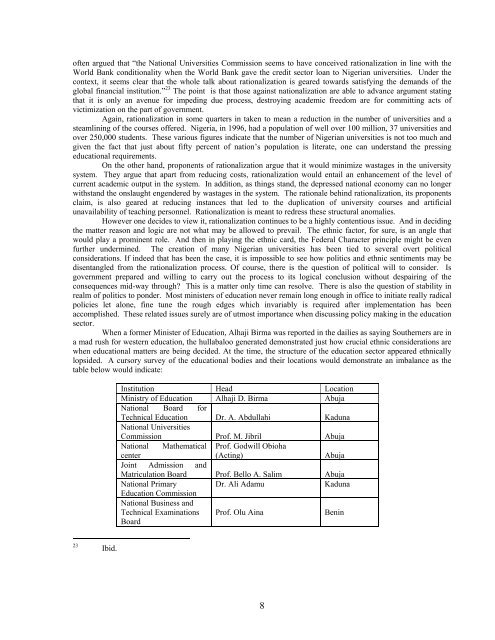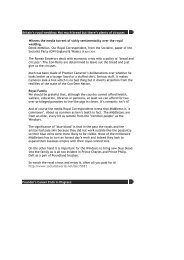Youth, Knowledge and Violence - Centre for Civil Society
Youth, Knowledge and Violence - Centre for Civil Society
Youth, Knowledge and Violence - Centre for Civil Society
Create successful ePaper yourself
Turn your PDF publications into a flip-book with our unique Google optimized e-Paper software.
often argued that “the National Universities Commission seems to have conceived rationalization in line with the<br />
World Bank conditionality when the World Bank gave the credit sector loan to Nigerian universities. Under the<br />
context, it seems clear that the whole talk about rationalization is geared towards satisfying the dem<strong>and</strong>s of the<br />
global financial institution.” 23 The point is that those against nationalization are able to advance argument stating<br />
that it is only an avenue <strong>for</strong> impeding due process, destroying academic freedom are <strong>for</strong> committing acts of<br />
victimization on the part of government.<br />
Again, rationalization in some quarters in taken to mean a reduction in the number of universities <strong>and</strong> a<br />
steamlining of the courses offered. Nigeria, in 1996, had a population of well over 100 million, 37 universities <strong>and</strong><br />
over 250,000 students. These various figures indicate that the number of Nigerian universities is not too much <strong>and</strong><br />
given the fact that just about fifty percent of nation’s population is literate, one can underst<strong>and</strong> the pressing<br />
educational requirements.<br />
On the other h<strong>and</strong>, proponents of rationalization argue that it would minimize wastages in the university<br />
system. They argue that apart from reducing costs, rationalization would entail an enhancement of the level of<br />
current academic output in the system. In addition, as things st<strong>and</strong>, the depressed national economy can no longer<br />
withst<strong>and</strong> the onslaught engendered by wastages in the system. The rationale behind rationalization, its proponents<br />
claim, is also geared at reducing instances that led to the duplication of university courses <strong>and</strong> artificial<br />
unavailability of teaching personnel. Rationalization is meant to redress these structural anomalies.<br />
However one decides to view it, rationalization continues to be a highly contentious issue. And in deciding<br />
the matter reason <strong>and</strong> logic are not what may be allowed to prevail. The ethnic factor, <strong>for</strong> sure, is an angle that<br />
would play a prominent role. And then in playing the ethnic card, the Federal Character principle might be even<br />
further undermined. The creation of many Nigerian universities has been tied to several overt political<br />
considerations. If indeed that has been the case, it is impossible to see how politics <strong>and</strong> ethnic sentiments may be<br />
disentangled from the rationalization process. Of course, there is the question of political will to consider. Is<br />
government prepared <strong>and</strong> willing to carry out the process to its logical conclusion without despairing of the<br />
consequences mid-way through? This is a matter only time can resolve. There is also the question of stability in<br />
realm of politics to ponder. Most ministers of education never remain long enough in office to initiate really radical<br />
policies let alone, fine tune the rough edges which invariably is required after implementation has been<br />
accomplished. These related issues surely are of utmost importance when discussing policy making in the education<br />
sector.<br />
When a <strong>for</strong>mer Minister of Education, Alhaji Birma was reported in the dailies as saying Southerners are in<br />
a mad rush <strong>for</strong> western education, the hullabaloo generated demonstrated just how crucial ethnic considerations are<br />
when educational matters are being decided. At the time, the structure of the education sector appeared ethnically<br />
lopsided. A cursory survey of the educational bodies <strong>and</strong> their locations would demonstrate an imbalance as the<br />
table below would indicate:<br />
23 Ibid.<br />
Institution Head Location<br />
Ministry of Education Alhaji D. Birma Abuja<br />
National Board <strong>for</strong><br />
Technical Education<br />
National Universities<br />
Dr. A. Abdullahi<br />
Kaduna<br />
Commission<br />
National Mathematical<br />
center<br />
Joint Admission <strong>and</strong><br />
Matriculation Board<br />
National Primary<br />
Education Commission<br />
National Business <strong>and</strong><br />
Technical Examinations<br />
Board<br />
Prof. M. Jibril<br />
Prof. Godwill Obioha<br />
(Acting)<br />
8<br />
Abuja<br />
Abuja<br />
Prof. Bello A. Salim<br />
Abuja<br />
Dr. Ali Adamu Kaduna<br />
Prof. Olu Aina<br />
Benin
















